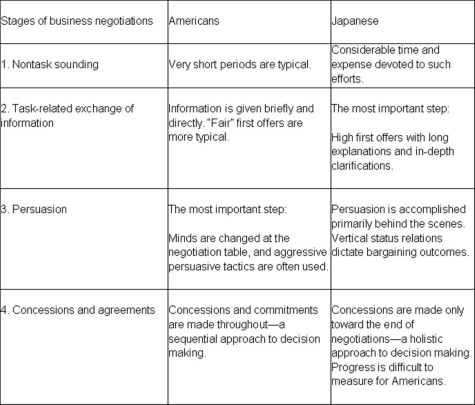Exam 19: Inventive Negotiations With International Customers, Partners, and Regulators
Exam 1: The Scope and Challenge of International Marketing94 Questions
Exam 2: The Dynamic Environment of International Trade110 Questions
Exam 3: History and Geography: The Foundations of Culture100 Questions
Exam 4: Cultural Dynamics in Assessing Global Markets105 Questions
Exam 5: Culture, Management Style, and Business Systems99 Questions
Exam 6: The Political Environment: a Critical Concern100 Questions
Exam 7: The International Legal Environment: Playing by the Rules100 Questions
Exam 8: Developing a Global Vision Through Marketing Research100 Questions
Exam 9: Economic Development and the Americas112 Questions
Exam 10: Europe, Africa, and the Middle East112 Questions
Exam 11: The Asia Pacific Region110 Questions
Exam 12: Global Marketing Management: Planning and Organization99 Questions
Exam 13: Products and Services for Consumers100 Questions
Exam 14: Products and Services for Businesses100 Questions
Exam 15: International Marketing Channels100 Questions
Exam 16: Integrated Marketing Communications and International Advertising99 Questions
Exam 17: Personal Selling and Sales Management100 Questions
Exam 18: Pricing for International Markets100 Questions
Exam 19: Inventive Negotiations With International Customers, Partners, and Regulators100 Questions
Select questions type
In the context of international business negotiations, verbal tactics used during negotiations differ vastly across diverse cultures.
Free
(True/False)
4.9/5  (41)
(41)
Correct Answer:
False
Compare the American and Japanese approaches during the four stages of business negotiations.
Free
(Essay)
4.8/5  (40)
(40)
Correct Answer:
A comparison of the American and Japanese approaches during the four stages of business negotiations is given below: 
Which of the following aspects of international business negotiations is considered to be the most difficult?
Free
(Multiple Choice)
4.9/5  (43)
(43)
Correct Answer:
C
In the context of task-related exchange of information, _____ negotiators are more likely to provide brutally frank negative feedback to foreign presenters.
(Multiple Choice)
4.9/5  (35)
(35)
Which of the following statements reflects the American notions of the importance of objectivity?
(Multiple Choice)
4.8/5  (33)
(33)
Which of the following aspects of the negotiation setting is an important consideration as it may eventually determine legal jurisdiction if disputes arise?
(Multiple Choice)
4.8/5  (38)
(38)
The egalitarian values of American society dictate that American sellers give complete deference to the needs and wishes of buyers.
(True/False)
4.8/5  (26)
(26)
Give a brief description of the styles of negotiation of the Japanese, the Koreans, and the French.
(Essay)
4.9/5  (33)
(33)
In the context of international business negotiations, age and experience are known to affect the negotiation behaviors of individuals.
(True/False)
4.9/5  (39)
(39)
Which of the following methods can be used to minimize the inevitable errors that crop up while exchanging information across language barriers?
(Multiple Choice)
4.9/5  (36)
(36)
Four values-objectivity, competitiveness, equality, and punctuality-that are held strongly and deeply by most Americans seem to frequently cause misunderstandings and bad feelings in international business negotiations.
(True/False)
4.8/5  (40)
(40)
Which of the following actions must be taken by a negotiator before international negotiations begin?
(Multiple Choice)
5.0/5  (37)
(37)
In the context of international business negotiations, individual personalities and backgrounds have no bearing at the negotiation table.
(True/False)
4.8/5  (42)
(42)
In the context of international business negotiations, generalizations about the negotiation style of a region such as Asia are very often correct.
(True/False)
4.8/5  (42)
(42)
In relationship-oriented cultures, _____ speaks quite loudly in both persuasion and the demonstration of interest in a business relationship.
(Multiple Choice)
4.8/5  (45)
(45)
The Japanese business negotiation style comprises an infrequent use of no and you and facial gazing, as well as more frequent silent periods.
(True/False)
4.9/5  (33)
(33)
The single most important activity of international business negotiations is oration.
(True/False)
4.7/5  (38)
(38)
In the context of the effect of values on international business negotiations, American buyers achieve better results than Japanese buyers.
(True/False)
4.8/5  (35)
(35)
In the context of international business negotiations, objectivity is key for negotiators working in China.
(True/False)
4.7/5  (35)
(35)
In the context of international business negotiations, the variation across cultures is greater when comparing linguistic aspects of language than when the verbal content of negotiations is considered.
(True/False)
4.8/5  (39)
(39)
Showing 1 - 20 of 100
Filters
- Essay(0)
- Multiple Choice(0)
- Short Answer(0)
- True False(0)
- Matching(0)